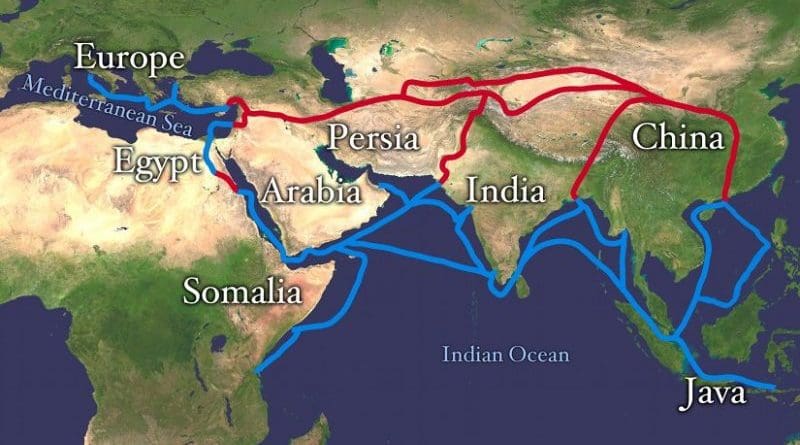One Belt One Road: A Step Towards Globalization – OpEd
Globalization refers to the international interaction among governments, people, and companies of different countries through the exchanging of products, ideas, products, and cultural practices. As such, Brexit and US President Trump’s slogan “America First” has challenged globalization. The protectionist sentiments are taking over in major economies of west. Populist or right-wing parties are also thriving across the developed world.
On the one side globalization is facing a major test of sustainability in the west with growing populism and trade protectionism, but on the other the trend of globalization is spreading in Asia. Globalization is creating new opportunities and at the same time facing threats to the region towards deeper integration.
The trend of globalization is not new for this region, if you look at the history we will find that first experiment of free international read was brought by the Silk Road that transported goods, including silk, through China to Central Asia, and ultimately extended into Southeast Asia, South Asia and the Mediterranean. Apart from goods, Silk Road carried unexpected inspirations like the merging of religion, culture, and language.
In the same historical spirit, China has recently offered several key international projects, including BRICS New Development Bank, Asian Infrastructure Investment Bank, extension of Shanghai Cooperation Organization, the National Silk Road Fund and the One Belt One Road (OBOR) initiative. The OBOR initiative represents Chinese thinking of new globalization, while NDB, AIIB and BRICS are multidimensional financial tools.
With the clear object of win-win cooperation, the OBOR initiative has been widely appreciated and received a great deal of support. It is an agreement based on the integration of notions where the geographical range, partner states, principles, rules, and strategies are openly defined at the beginning.
The OBOR initiative focuses on both West and East. In a broader perspective it seems more as a policy dial, than a bunch of projects, which link three continents – Asia, Africa and Europe. Apart from this China is also considering at a free trade zone in the Asia-Pacific region, probably connecting with the United States. Furthermore, China is also working on tri-lateral settlements with EU and US in Latin America and Africa, where her interests are not forthrightly connected but wants to establish a global tendency.
Chinese leadership believes that open-ended networks of global production have extended wealth globally, which ultimately reduce poverty and lessen inequality in developing countries. Indeed, China is a good example of this, as its export based industrial development has produced tens of millions of well-paid urban industrial jobs.
The OBOR initiative is offering a great deal of issues to the dispossessed and poor of the global south or third world, which may start getting benefits from globalization. But for the west, globalization all of a sudden has become a big, bad bogey and is being represented as unfair and inequitable by protectionist parties.
The champions of free trade and globalization are quiet these days because they always maintained a one way road for the exploitation and monopolization of the third world and their cheap labor and market. They just want their money without those countries problems, but OBOR is vice-versa. Thus, it has become easy and rewarding for the developed west to start campaign against immigrants, blaming them for occupying their jobs and creating problems like, crime and terrorism.
No one can deny that globalization has helped hardworking and enterprising communities and societies, pushing a large number of people out of poverty. It has created huge capital and enormous economic prospects where before none existed. It was the west that introduced the qualities of free markets and pushed to accept it as a growth model, therefore they should not yell now because of the effects of globalization. This is a natural progress, sometimes you win, sometimes you lose.
The OBOR initiative is directed toward more people-centered objectives to indicate that it really is what society needs, not protectionism. It deepens regional and international integration and uses globalization to stretch benefits further. China firmly believes that globalization can succeed, but when everyone gets benefits.


Good work,it has started to speak.